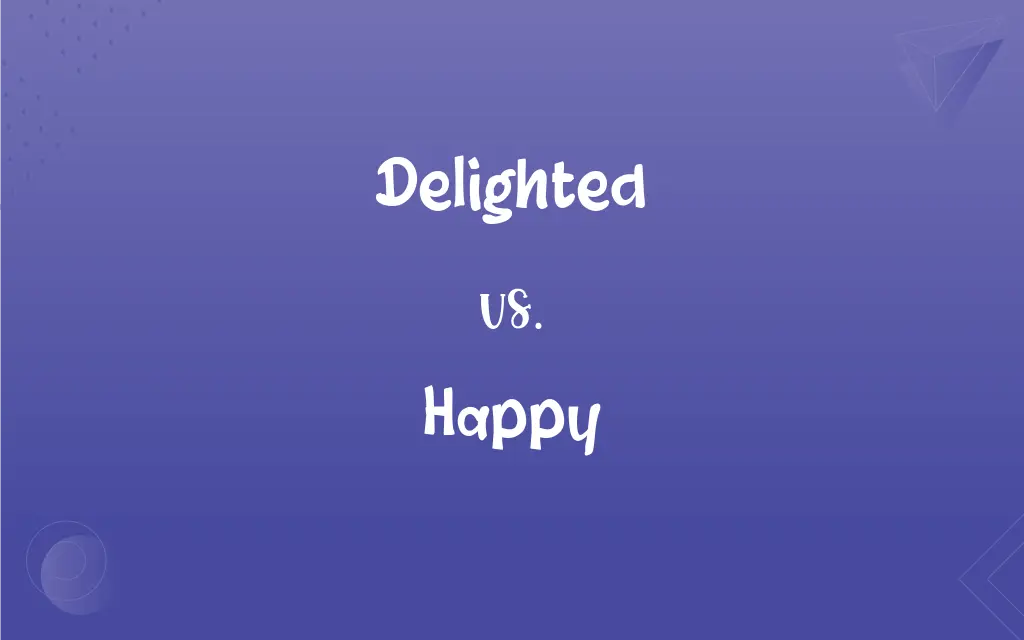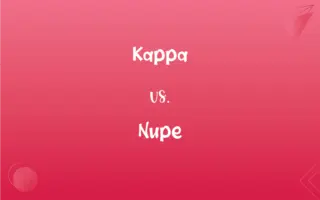Delighted vs. Happy: What's the Difference?
Edited by Aimie Carlson || By Janet White || Published on November 29, 2023
Delighted implies a high degree of pleasure, often more intense and momentary than happy, which suggests a lasting, contented state of being.

Key Differences
Delighted often conveys a sense of intense, sometimes sudden joy, typically in response to a specific event or stimulus. Happy, on the other hand, is a more general, enduring state of well-being and contentment, not necessarily tied to one particular cause.
The usage of delighted usually implies a certain level of excitement and elation, suggesting a reaction that is more profound than mere satisfaction. Happy, while positive, can describe a broader range of emotions, from mild contentment to profound joy.
Delighted can be seen as a more expressive, emphatic term, often used to describe reactions to particularly pleasing or favorable circumstances. In contrast, happy can be applied to a wider variety of situations, indicating a general feeling of pleasure or contentment.
In literature and speech, delighted is often employed to emphasize a peak emotional experience, a moment of particular joy or satisfaction. Happy, conversely, is commonly used to denote an overall mood or disposition, rather than a response to a specific moment.
The emotional intensity associated with delighted often makes it a preferred choice in formal or emphatic contexts, whereas happy is versatile, suitable for both casual and formal situations, encapsulating a broad spectrum of positive emotional states.
ADVERTISEMENT
Comparison Chart
Intensity of Emotion
High, intense
Moderate, steady
Duration
Often momentary, fleeting
Long-lasting, stable
Cause
Specific event or stimulus
General state or various reasons
Usage Context
More formal, emphatic
Versatile, casual and formal
Emotional Depth
Peak emotional experience
Broad range of positive emotions
ADVERTISEMENT
Delighted and Happy Definitions
Delighted
Experiencing a high degree of pleasure.
They were delighted by the performance.
Happy
Having a sense of well-being and satisfaction.
She was happy with her new home.
Delighted
Feeling great pleasure or joy.
She was delighted to receive the award.
Happy
Cheerful and joyful.
The children were happy playing in the park.
Delighted
Showing joyful satisfaction.
Her face was delighted at the news.
Happy
Apt or well-chosen.
It was a happy choice of words.
Delighted
Highly pleased or satisfied.
He was delighted with the surprise party.
Happy
Feeling or showing contentment or pleasure.
He felt happy after a good day's work.
Delighted
Ecstatic or thrilled.
She was delighted to meet her favorite author.
Happy
Fortunate or lucky.
It was a happy coincidence that they met.
Delighted
Filled with delight.
Happy
Enjoying, showing, or marked by pleasure, satisfaction, or joy
A happy child.
The happiest day of my life.
Delighted
(Obsolete) Delightful.
Happy
Cheerful; willing
Happy to help.
Delighted
Greatly pleased.
Happy
Characterized by good luck
A happy sequence of events.
Delighted
Filled with wonder and delight.
Delighted
Simple past tense and past participle of delight
Delighted
Endowed with delight.
If virtue no delighted beauty lack.
Delighted
Greatly pleased
Delighted
Filled with wonder and delight
FAQs
Do delighted and happy have the same duration?
Delighted is often momentary, while happy can be a lasting state.
Is delighted more intense than happy?
Yes, delighted often implies a higher degree of pleasure.
Is happy a more general feeling?
Yes, happy can describe a broader, more enduring state of contentment.
Can something make you both delighted and happy?
Yes, an event can elicit immediate delight and contribute to overall happiness.
Can happy indicate a sense of well-being?
Yes, happy often encompasses a general feeling of well-being.
Is delighted used in more formal contexts?
Generally, yes, delighted is often used in formal or emphatic contexts.
Does happy have different connotations in various cultures?
Yes, the perception of happiness can vary culturally.
Can delighted and happy be used interchangeably?
They can be, but delighted usually refers to a more intense emotion.
Can use of delighted be subjective?
Yes, the use of delighted can vary based on personal or cultural contexts.
Are there synonyms that can replace delighted and happy?
Yes, words like elated, joyful, pleased can substitute delighted; content, glad for happy.
Do delighted and happy have different origins?
Yes, they come from different linguistic roots with distinct historical uses.
Is delighted always a reaction to something specific?
Typically, yes, it's often in response to a specific event or stimulus.
Is happy more commonly used in everyday language?
Yes, happy is more versatile and widely used in daily conversation.
Is happy used in formal writing?
Yes, though its use depends on the tone and context of the writing.
Can mood influence the choice between delighted and happy?
Absolutely, personal mood and context greatly influence word choice.
Can happy describe a personality trait?
Yes, happy can describe someone's general disposition.
Is delighted a stronger expression of happiness?
Yes, it usually indicates a more intense form of happiness.
Can delighted be used sarcastically?
Yes, like many emotional expressions, it can be used sarcastically.
Can the intensity of delighted vary?
While typically intense, its degree can vary depending on context.
Are there cultural variations in the use of delighted?
Yes, cultural factors can influence how and when delighted is used.
About Author
Written by
Janet WhiteJanet White has been an esteemed writer and blogger for Difference Wiki. Holding a Master's degree in Science and Medical Journalism from the prestigious Boston University, she has consistently demonstrated her expertise and passion for her field. When she's not immersed in her work, Janet relishes her time exercising, delving into a good book, and cherishing moments with friends and family.
Edited by
Aimie CarlsonAimie Carlson, holding a master's degree in English literature, is a fervent English language enthusiast. She lends her writing talents to Difference Wiki, a prominent website that specializes in comparisons, offering readers insightful analyses that both captivate and inform.






































































